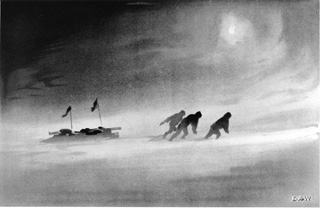
Yale University Press August 2001
"Had we lived, I should have had a tale to tell of the hardihood, endurance, and courage of my companions which would have stirred the heart of every Englishman. These rough notes and our dead bodies must tell the tale." -R. Scott, written after traveling for weeks of daily temperatures below -35ºF.
"An absorbing, fascinating read -- a book that will appeal to the explorer in everyone." -Sally Ride
"This is a very well balanced and meticulously researched book. It shows beyond doubt how false and shallow have been the many malicious and blinkered books and films in their bland condemnation of Captain Scott as a bumbler and inept leader. Quite the opposite was actually true, and The Coldest March goes a long way to putting polar history right and thereby to killing off the vicious myth about one of Britain's great explorers." -Sir Ranulph Fiennes, polar explorer and expedition leader
"A great adventure story, made even more compelling by a modern scientific detective." -Bruce Babbitt, former Secretary of the Interior
"A fresh and captivating look at one of the most tragic sagas in the annals of exploration. Solomon takes the reader on a breathtaking ride through Antarctica's beauty, history, and uniquely forbidding weather, weaving stunning scientific insights into the story of the lives and deaths of the men of Scott's last expedition in a forensic tour de force. Carefully researched, innovative, and elegantly written, The Coldest March will fascinate and inform anyone intrigued by polar adventure or the interplay of science and society." -Paul Ehrlich, author of Human Natures and Wild Solutions
"An inspiring chronicle of Antarctic scientific exploration at its most heroic. From the vantage point of history and her personal experience in Antarctica and with all the human and scientific insights of the outstanding scientist that she is, Susan Solomon has written a masterpiece. It is a tale of vision, courage, endurance, patriotism, loyalty, and all the strengths and frailties of the human spirit. Above all, it is good science, good history, and gripping reading." -J.W. Zillman, president of the World Meteorological Organization